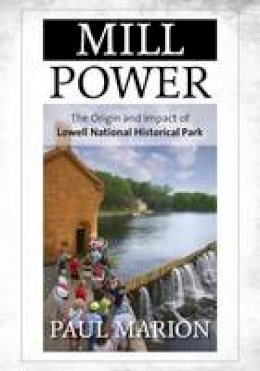
Stock image for illustration purposes only - book cover, edition or condition may vary.
Mill Power: The Origin and Impact of Lowell National Historical Park
Paul Marion
€ 130.92
FREE Delivery in Ireland
Description for Mill Power: The Origin and Impact of Lowell National Historical Park
Hardback. Num Pages: 288 pages, 126 colour illustrations. BIC Classification: 1KBBE; 3JH; 3JM; AM; GM; HBJK. Category: (P) Professional & Vocational. Dimension: 190 x 262 x 25. Weight in Grams: 802.
Mill Power documents the making of a national park that changed the concept of what a national historical park could be. For a time in the 1800s, Lowell was Massachusetts's cosmopolitan, must-see second city. The city's industrial model was as high-tech then as Silicon Valley is today. It drew the attention of luminaries like Charles Dickens, Congressmen Davy Crockett and Abraham Lincoln, feminist sociologist Harriet Martineau, and abolitionist Frederick Douglass. This insider's account of the creative, bold community-driven process to establish the park explains why today Lowell National Historical Park is renowned as the partnership park. The park's establishment was an integral piece of an urban revival strategy that has made Lowell the subject of scores of newspaper articles, magazine profiles, TV and radio reports, scholarly papers, and book chapters.
Product Details
Publisher
Rowman & Littlefield
Format
Hardback
Publication date
2014
Condition
New
Number of Pages
288
Place of Publication
Lanham, MD, United States
ISBN
9781442236288
SKU
V9781442236288
Shipping Time
Usually ships in 15 to 20 working days
Ref
99-15
About Paul Marion
Paul Marion was born in Lowell and graduated from the University of Massachusetts -Lowell. In the 1980s, he was an administrator with the Lowell Historic Preservation Commission, U.S. Department of the Interior, helping to develop the programs and properties of the Lowell National Historical Park. A co-founder of the Lowell Folk Festival and Lowell Heritage Partnership, he was instrumental in the development of the Lowell Cultural Plan, Mogan Cultural Center, and the Jack Kerouac Commemorative. He is currently executive director of community relations at the University of Massachusetts - Lowell.
Reviews for Mill Power: The Origin and Impact of Lowell National Historical Park
[M]any . . . non-native Lowellians . . . followed the hard work of several remarkable people who believed that Lowell was worth saving from the ash heap. Marion, who has deep roots in the city and today is the executive director of community and cultural affairs at UMass Lowell, skillfully tells the stories of these individuals, from Mogan to the late Paul Tsongas, a congressman from Massachusetts who helped push through the legislation that established Lowell National Historical Park when President Jimmy Carter signed the bill on June 5, 1978. . . .Marion includes a number of striking photographs in Mill Power. Many show what downtown Lowell looked like before the creation of the park, illustrating the city's dramatic transformation in a way no narrative can. The book, a solid, well researched history of the city - from the Pawtucket and Wamesit Indians to the early 21st century - should be on every Lowellian's shelf.
Merrimack Valley Magazine
Merrimack Valley Magazine
